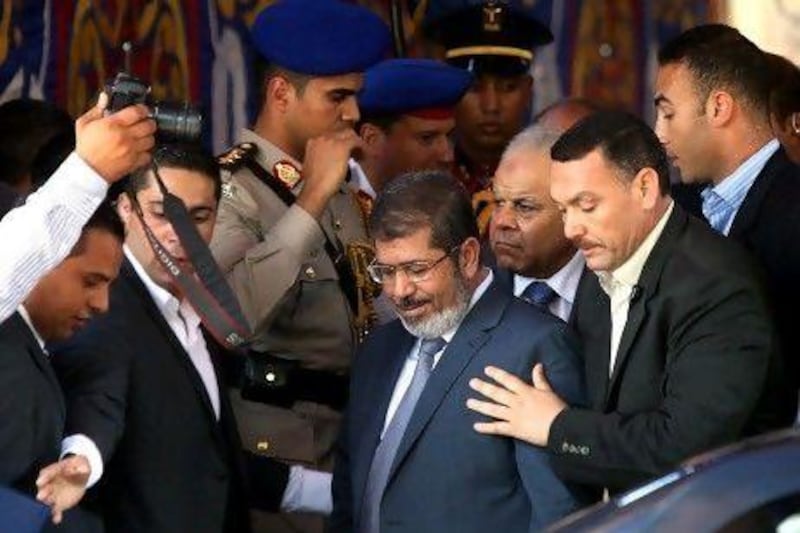CAIRO // Crowds thronged Cairo's iconic Tahrir Square on Friday as Islamist Mohamed Morsi prepared to address supporters on the eve of his swearing-in as Egypt's first civilian president.
Hundreds gathered from mid-morning braving the searing heat, hours before Morsi was expected to arrive in the huge central plaza that was the epicentre of the protest movement that ousted veteran strongman Hosni Mubarak last year.
Chants against the ruling military which took over on Mubarak's overthrow rang out from among the crowd.
Even after taking the oath, Morsi will still have to contend with the Supreme Council of the Armed Forces, headed by Mubarak's longtime defence minister Field Marshal Hussein Tantawi, which will retain broad powers after it formally transfers power.
The liberal Wafd newspaper reported that Tantawi will stay on as defence minister in Morsi's new government.
"Down with the power of the military," the demonstrators chanted. "Field marshal, tell us the truth -- is Morsi your president or not?"
The slogans dented hopes expressed in an editorial in the flagship state-owned daily Al-Ahram Friday that announcement of the details of Morsi's swearing-in would end speculation about the military's real intentions.
"The swearing-in should dispel once and for all the doubts raised by those who have used every means to question the military's readiness to hand over power," the paper said.
Morsi spokesman Yasser Ali told state MENA news agency the president-elect would "make a speech to the great Egyptian people" in which he would speak about "efforts to launch his programme for the rebirth of Egypt."
The Muslim Brotherhood, from which Morsi resigned after winning the presidency, had called for a huge demonstration in Tahrir, under the slogan: "Day of the transfer of power."
The presidency announced late on Thursday that Morsi would be sworn in Saturday before the Constitutional Court, after differences with the army over the transfer of power to the nation's first civilian president.
Morsi "will go at 11 am (0900 GMT) Saturday to the Constitutional Court to take the oath before the Court's general assembly", said a statement released by MENA.
Traditionally the president takes the oath in parliament, but Egypt's top court has ordered the disbanding of the Islamist-dominated legislature.
The military subsequently assumed legislative powers and also formed a powerful national security council headed by the president but dominated by generals.
By agreeing to be sworn in by the Constitutional Court, Morsi is effectively acknowledging the court's decision to dissolve parliament.
The SCAF also reserves the right to appoint a new constituent assembly should the one elected by parliament be disbanded by a court decision expected on September 1, even though though the Brotherhood insists that only parliament can appoint the assembly.
Media reports said Morsi was consulting a cross-section of Egyptian society before appointing a premier and a cabinet mostly made up of technocrats.
In a meeting with Egyptian newspaper editors reported by most dailies on Friday, Morsi pledged there would be "no Islamisation of state institutions" during his presidency.
Morsi has already met the SCAF chief, as well as a delegation from the Sunni body Al-Azhar, and another representing Egypt's Coptic church.
Ahead of his speech, Morsi attended the main weekly Muslim prayers at Al-Azhar, Sunni Islam's highest seat of learning. Its imam, who served as religious endowments minister in the outgoing government, called in his sermon for an inclusive Egypt.
"This must be the homeland of all its citizens with equality between individuals in a true democracy in which all can express themselves while respecting morality," Mohammed Abdel Fadil al-Qawsi said.
"No to discrimination between individuals, groups or communities. The leader should be everyone's leader."
The Brotherhood and Al-Azhar, whose imams are named by the Egyptian government, had strained relations under Mubarak, and Qawsi called on Morsi to maintain the institution's privileged position under his presidency.
"I am sure that Mr President is among those who believe in the role of Al-Azhar and who want it to remain an institution that unites Muslims around the world and provides a protection against terrorism," he said.





